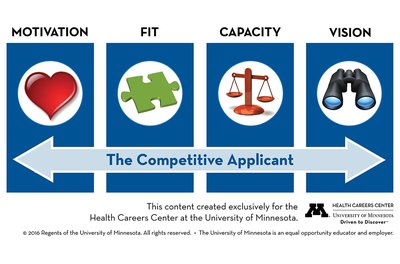
The personal statement is an unfamiliar genre for most students — you’ve practiced writing lab reports, analytical essays, maybe even creative fiction or poetry, but the personal statement is something between a reflective, analytical narrative and an argumentative essay. You want to reveal something about yourself and your thoughts around your future in medicine while also making an argument that provides evidence supporting your readiness for your career. Well ahead of when you’re writing your personal statement, consider taking classes that require you to create and support arguments through writing, or those that ask you to reflect on your personal experiences to help you sharpen these skills.®
As you draft your essay, you may want to include anecdotes from your experiences. It’s easiest to recall these anecdotes as they happen, so it can be helpful to keep a journal where you can jot down stories, conversations, and insights that come to you. This could be recounting a meaningful conversation that you had with someone, venting after an especially challenging experience, or even writing about what keeps you going at times when you feel in danger of giving up. If it’s more comfortable, take audio notes by talking into your phone.
While reading sample personal statements can sometimes make a student feel limited to emulating pieces that already exist, I do think that reading others’ reflective writing can be inspirational. The Aspiring Docs® Diaries blog written by premeds is one great place to look, as are publications like the Bellevue Literary Review and Pulse, which will deliver a story to your inbox every week. Check with your prehealth advisor to see if they have other examples that they recommend.
Rachel Tolen, Assistant Director and Premedical Advisor, Indiana University
I encourage students to think of the personal statement not just as a product. Instead, I encourage them to think of the process of writing the statement as embedded in the larger process of preparing themselves for the experience of medical school. Here are a few key tips that I share with students:
- Start writing early, even months before you begin your application cycle. Expect to revise many versions of your draft over time.
- Take some time to reflect on your life and goals. By the end of reading your statement, the reader should understand why you want to be a physician.
- When you consider what to write, think about the series of events in your life that have led up to the point where you are applying to medical school. How did you get here? What set you on the path toward medical school? What kept you coming back, even at times when it was challenging? On the day that you retire, what do you hope you’ll be able to say you’ve achieved through your work as a physician?
- Don’t waste too much time trying to think of a catchy opening or a theme designed just to set your essay apart. Applicants sometimes end up with an opening that comes across as phony and artificial because they are trying too hard to distinguish themselves from other applicants.
- Just start writing. Writing is a means for thinking and reflecting. Let the theme grow out of the process of writing itself. Some of the best personal statements focus on ordinary events that many other people may have experienced, but what makes the essay stand out are the writer’s unique insights and ability to reflect on these experiences.
Dana Lovold, MPH, Career Counselor at the University of Minnesota
Your personal statement can and should include more than what you’ve done to prepare for medical school. The personal statement is an opportunity to share something new about yourself that isn’t conveyed elsewhere in your application.
Advisors at the University of Minnesota employ a storytelling model to support students in finding and writing their unique personal statement. One critical aspect of storytelling is the concept of change. When a story lacks change, it becomes a recitation of facts and events, rather than a reflection of how you’ve learned and grown through your experiences. Many students express concern that their experiences are not unique and wonder how they can stand out. Focusing on change can help with this. Some questions you may want to consider when exploring ideas are:
- What did you learn from the experience?
- How did you change as a result of the experience?
- What insight did you gain?
By sharing your thoughts on these aspects of your preparation and motivation for medicine, the reader has a deeper understanding of who you are and what you value. Then, connect that insight to how it relates to your future in the profession. This will convey your unique insight and demonstrate how you will use that insight as a physician.
In exploring additional aspects of what to write about, we also encourage students to cover these four components in the essay:

- Motivation refers to a student’s ongoing preparation for the health profession and can include the initial inspiration.
- Fit is determined through self-assessment of relevant values and personal qualities as they relate to the profession.
- Capacity is demonstrated through holistically aligning with the competencies expected in the profession.
- Vision relates to the impact you wish to make in the field.
After you finish a working draft, go back through and see how you’ve covered each of these components. Ask people who are reading your draft if they can identify how you’ve covered these elements in your essay so that you know it’s clear to others.